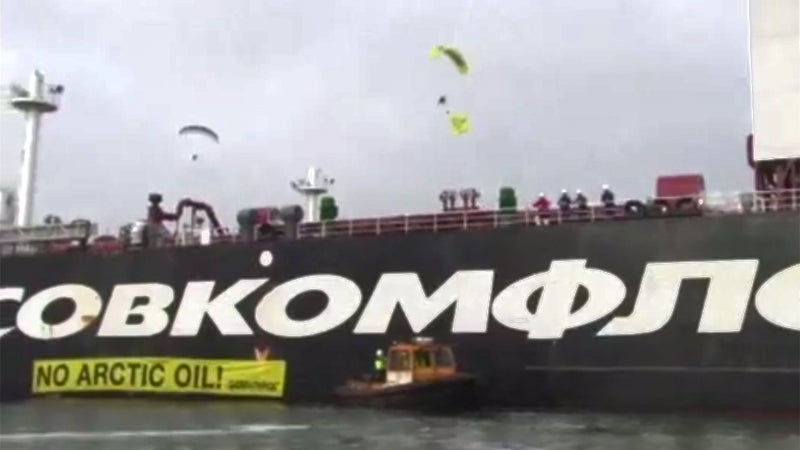Greenpeace activists and Russian oil company , adversaries at polar ends of the Arctic drilling debate, went head-to-head Thursday as activists tried to stop a Gazprom tanker from docking in Rotterdam, Holland. Although the tanker Mikhail Ulyanov is reported to have docked successfully, the lenient nature of the Dutch response to Greenpeace’s dissent relative to that of other countries incited discussion.
Dutch authorities took the 44 paragliding, sailing, and SCUBA-equipped activists into custody in several Rotterdam police stations. They also towed the famed ashore. However, the majority of protesters were released without charges within hours.
When the known as in international waters this past September, however, Russia greeted the 28 activists and two journalists with 10 heavily armed commandoes who and rounded up the crew. The activists were on criminal charges of piracy and hooliganism, though the charges were later dropped.
Greenpeace International Arctic campaigner Ben Ayliffe thinks the Dutch response marks a significant turn in Arctic protesting.
“It tells us more about how the authorities deal with dissent in Holland compared to Russia,” Ayliffe said in an interview with the Guardian. “We had every intention of stopping the oil being offloaded. The intention was just as serious as it was in Russia last September.”
In the wake of the Arctic 30 incident, Russia asked the Dutch ambassador to put a stop to Arctic protests. Greenpeace’s icebreaker is registered in Holland. The ambassador seems to have had more pressing concerns.
as the region’s icecaps began melting more quickly in response to global warming. The oil and gas industry is in pursuit of an estimated 1,670 trillion cubic feet of natural gas and 90 billion barrels of oil—22 percent of the world’s petroleum resources.
Groups such as Greenpeace say that the energy resources aren’t worth potential well blowouts or risks to the environment. Greenpeace is calling for an end to offshore Arctic oil drilling worldwide—and not just for environmental reasons.
“It’s increasingly clear that our reliance on oil and gas is a major threat not just to the environment but to global security,” says Greenpeace International executive director Kumi Naidoo. “Arctic oil represents a dangerous new form of dependence on Russia’s state-owned energy giants at the very moment when we should be breaking free of their influence. We cannot hope for any kind of ethical foreign policy while our governments remain hopelessly dependent on companies like BP, Shell, and Gazprom.”


